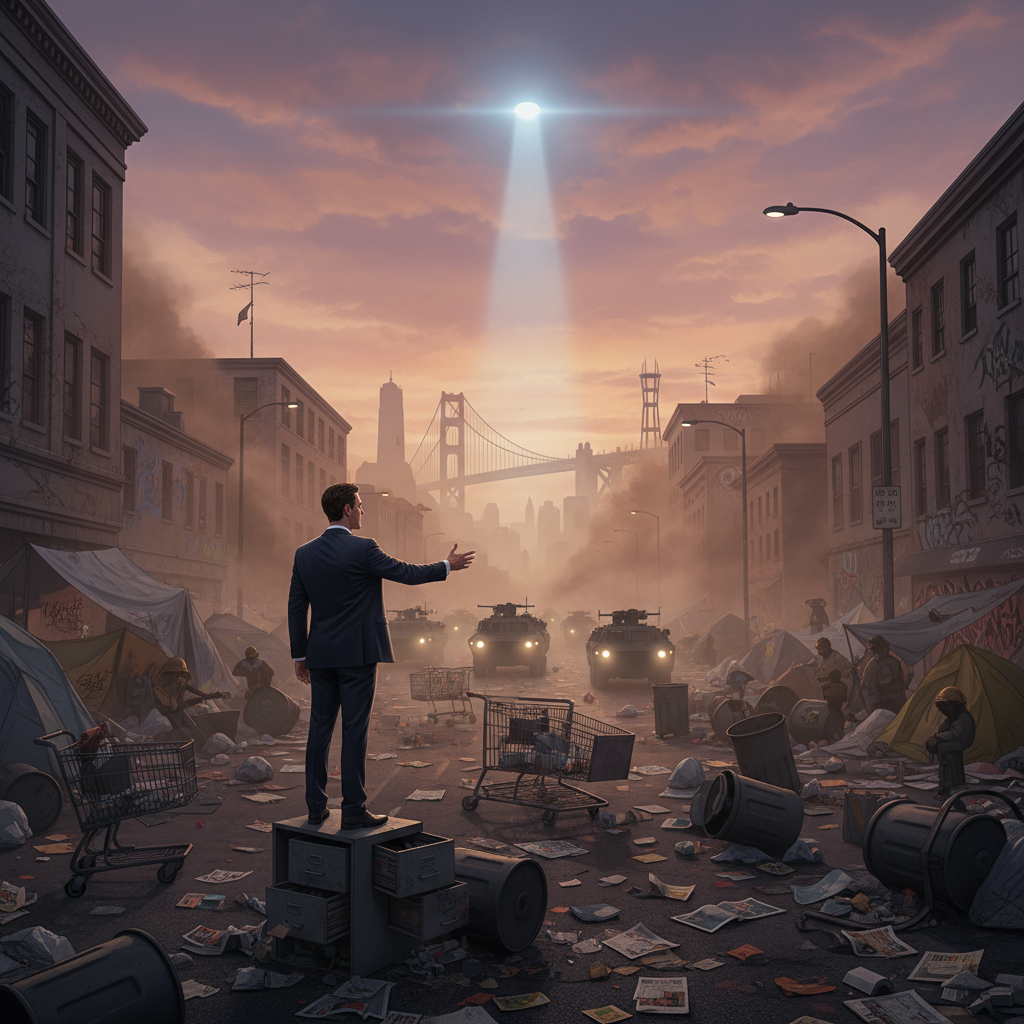When Tech Titans Call for Troops: Salesforce CEO’s Shocking San Francisco Suggestion

San Francisco, the gleaming jewel of innovation, the birthplace of counter-culture, and the epicenter of tech’s golden age. It’s a city of contrasts, where towering skyscrapers stand alongside a persistent homelessness crisis, and groundbreaking startups share sidewalks with open-air drug use. These well-documented challenges have sparked fierce debate and frustration, but few could have predicted the recent bombshell dropped by a prominent tech leader. Marc Benioff, co-founder and CEO of Salesforce, a company deeply intertwined with the city’s identity, made a startling suggestion: deploy the National Guard to patrol San Francisco.
This isn’t merely a headline-grabbing statement; it’s a stark indicator of the perceived severity of San Francisco’s urban struggles from the very top of its business community. The idea of uniformed military personnel patrolling the streets of a major American city, especially one as liberal and progressive as San Francisco, is not only provocative but raises a multitude of questions about the city’s current state, its future, and the role of its most influential residents. Let’s unpack the implications of Benioff’s extraordinary proposal.
The CEO’s Rationale: A Cry for Order Amid Chaos?

While the initial reaction to Benioff’s call for the National Guard might be shock, it stems from a larger, more deeply rooted concern felt by many residents and business owners in San Francisco. Reports of property crime, retail theft, and the visible challenges of homelessness and drug addiction have painted a picture of a city struggling to maintain basic order. Businesses, including major retailers, have either reduced hours, closed locations, or voiced significant concerns about employee and customer safety.
Benioff’s statement, delivered at a time when companies are increasingly scrutinizing their physical office footprints and encouraging remote work, can be interpreted as a desperate plea for a return to stability. For a company like Salesforce, whose towering headquarters dominate the city skyline, the health and vibrancy of San Francisco are directly tied to its own reputation and ability to attract and retain talent. The CEO’s words underscore a belief that existing municipal efforts are insufficient, and perhaps, that a more drastic intervention is needed to restore a sense of safety and normalcy.
It’s important to consider what prompted such an extreme suggestion. Is it merely a frustrated outburst, or a calculated move to pressure city leadership into more decisive action? Without explicit details from Benioff himself, we can only speculate. However, the sentiment he expresses is not isolated. Many residents, even those who traditionally lean progressive, express a growing exasperation with the perceived decline in quality of life and the city’s ability to address its most pressing issues effectively.
The Political and Social Fallout: A Divisive Proposal
Unsurprisingly, the suggestion to deploy the National Guard has ignited a firestorm of debate, exposing deep ideological fissures within San Francisco’s political landscape and among its citizens. On one hand, some residents and business leaders might quietly (or even openly) agree with Benioff, seeing it as a necessary, albeit extreme, measure to combat crime and restore public safety. For them, the deteriorating conditions warrant an emergency response, and the National Guard represents a decisive, visible force that could deter criminal activity.
On the other hand, a substantial segment of the population, particularly civil liberties advocates, progressive groups, and those who have experienced over-policing, would vehemently oppose such a move. The sight of armed military personnel on city streets evokes historical memories of past protests and crackdowns, raising serious concerns about potential abuses of power, infringement on civil liberties, and the militarization of civilian spaces. Critics would argue that deploying the National Guard is a heavy-handed, performative solution that fails to address the root causes of San Francisco’s problems, such as poverty, lack of affordable housing, mental health crises, and addiction. Instead, they would advocate for increased investment in social services, housing solutions, and community-based programs.
The political implications for city leadership are also significant. Endorsing such a proposal could alienate a large portion of their voter base, while dismissing it outright might be seen as ignoring the genuine concerns of the business community and some residents. The dialogue sparked by Benioff’s statement forces a difficult reckoning: how far is the city willing to go, and what measures are acceptable, to tackle its most intractable problems?
Beyond the Headlines: Seeking Sustainable Solutions
While Benioff’s proposal is attention-grabbing, it largely glosses over the complex, multi-faceted nature of San Francisco’s challenges. Crime, homelessness, and drug addiction are not isolated phenomena that can be solved by a temporary show of force. They are symptoms of deeper systemic issues.
- Addressing Root Causes: Sustainable solutions require a focus on mental health services, drug rehabilitation programs, affordable housing initiatives, and economic opportunities that provide pathways out of poverty.
- Community Engagement: Effective crime reduction strategies often involve stronger community policing, neighborhood partnerships, and restorative justice programs, rather than purely punitive measures.
- Leadership and Collaboration: What San Francisco truly needs is unified leadership that can bridge the divide between different factions, foster collaboration between the public and private sectors, and implement long-term, data-driven solutions.
The Salesforce CEO’s statement, though controversial, serves as a powerful call to action. It highlights the depth of frustration felt by a significant stakeholder in San Francisco’s future. It forces a critical question: what are the acceptable limits of intervention to save a city battling perceived decline? The answer likely lies not in short-term military deployments, but in a renewed commitment to comprehensive social policies, innovative urban planning, and a shared vision for a more equitable and safe San Francisco for all its residents.
Conclusion: A City at a Crossroads
Marc Benioff’s call for the National Guard in San Francisco is more than just a shocking headline; it’s a profound moment of reflection for a city facing an existential crisis of identity and order. It encapsulates the deep anxieties of its business leaders and some residents, who feel that the city is veering off course. While the practicality, legality, and social implications of such a deployment are highly debatable and likely untenable, the sentiment behind it cannot be ignored.
San Francisco stands at a crossroads. Its future depends not on quick fixes or militaristic displays, but on a collective will to engage with its most challenging problems head-on. This means fostering genuine dialogue, investing in long-term solutions, and demonstrating effective governance that can restore trust, safety, and a sense of shared purpose. The tech titans, city officials, and everyday citizens must all play a role in crafting a vision for San Francisco that can reclaim its innovative spirit while addressing its profound social needs, without resorting to emergency measures that betray its fundamental values.

